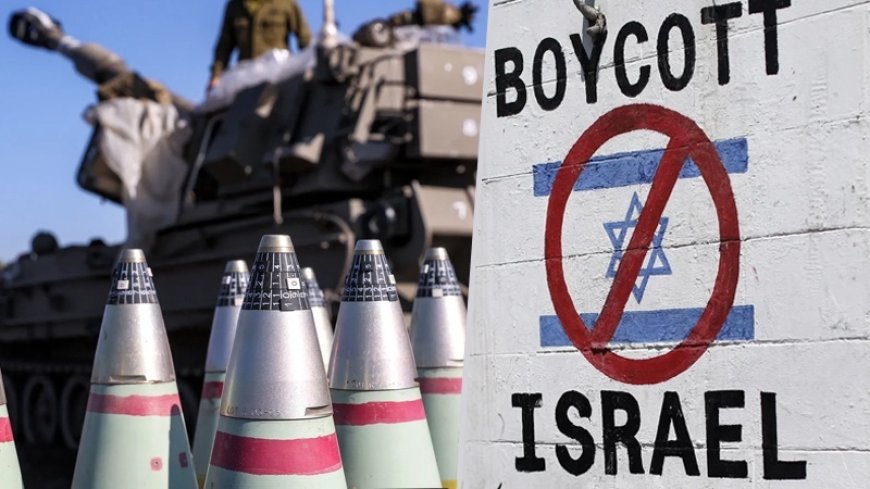Global trends indicate the desire of countries to boycott and isolate Israel
The Zionist regime is not only witnessing an unprecedented increase in sanctions against its affiliated institutions, including universities and research centers, but these sanctions have now extended to the level of military and weapons cooperation between Western and Israeli companies.

The Zionist regime is not only witnessing an unprecedented increase in sanctions against its affiliated institutions, including universities and research centers, but these sanctions have now extended to the level of military and weapons cooperation between Western and Israeli companies.
In its statement, Amnesty International called on European countries to boycott the weapons of the Zionist regime. According to Amnesty International's statement says: - These sanctions should include not only an arms embargo, but also some products that are used in the production chain of these weapons.
After the storm of Al-Aqsa on October 7, 2023, the Gaza war and the unprecedented crimes of the Zionist regime against the oppressed people of Gaza began, especially after causing genocide and famine in Gaza, the boycott movement of this regime began at the global level on an unprecedented scale, and many institutions and countries called have imposed an arms embargo on Israel.
A demand that was ignored by the USA, as the main supporter of that regime, as well as by some European countries, especially Germany.
Certainly, the peoples of many European countries have taken a strong stance against the Zionist regime and organized demonstrations and gatherings, as well as sit-ins, demanding an end to Israel's aggression and aid to the people of Gaza.
The UN special rapporteur on the right to food, Michael Fakhri, also said in mid-June 2024: "What we need now is economic and political sanctions against Israel."
The UN special rapporteur on the right to food emphasized the need for economic and political sanctions against Israel, given the ineffectiveness of political pressure against the Israeli regime and Israel's neglect of demands to stop the war and genocide in Gaza.
It should be noted that the Zionist regime is not only witnessing an unprecedented increase in sanctions against its affiliated institutions, including universities and scientific centers, but now these sanctions have also been extended to the level of military and weapons cooperation between Western and Israeli companies.
In this context, even some European countries have reconsidered cooperation with Israeli arms companies.
Citing two informed sources, Reuters news agency reported that France has banned Israeli companies from participating in the country's naval weapons exhibition.
However, some of Israel's European allies, especially Germany and Britain, continue to support the Zionist regime and send military equipment to this regime, and have even defended the killing of civilians in Gaza and Israel's crimes.
In this context, on October 10, German Foreign Minister Analena Baerbock's speech at the session of the German Federal Parliament, on the occasion of the first anniversary of Israel's attack on the Gaza Strip, received wide responses.
During this meeting, the German Foreign Minister claimed that Hamas was hiding in civilian gatherings and schools and said: "Of course, self-defense means destroying terrorists, not just attacking them."
On October 15, the UN Special Rapporteur on Palestine, Francesca Albanese, condemned Baerbock's statements in support of Israel's bombing of Palestinian refugee sites in Gaza and warned of the legal consequences of supporting a country that commits international crimes.
While more than 100 Muslim Labor Councils in Britain have sent a letter to the Prime Minister of this country, Keir Starmer, asking him to completely and immediately stop the sale of military weapons to the Zionist regime, but the London government still provides military support to Israel.
Of course, the global trend is against this and is consistent with the tightening of sanctions against Israel.
As the Wall Street Journal writes, after the stormy operation of Al-Aqsa on October 7, since the beginning of the attacks of the Zionist regime on Gaza, the scene of the movement supporting the boycott of this regime has undergone a great change.
The Boycott and Divestment of Israel (BDS) movement is an international campaign to pressure the Zionist regime to seize Palestinian land and build settlements on that land. This movement, which was created in 2005 with the support of 171 Palestinians, has so far managed to gain many followers all over the world, including Europe and America. The prime minister of the Zionist regime, Benjamin Netanyahu, said about this movement that the goal of its designers is to "destroy Israel".
Now, one year after the Gaza war, with the expansion of sanctions against Israel in various areas, even in Western countries, including Europe, America and Canada, it can be said that the nightmare of the Zionist leaders has come true in the context of the strengthening of the isolation of the Zionist regime.













































